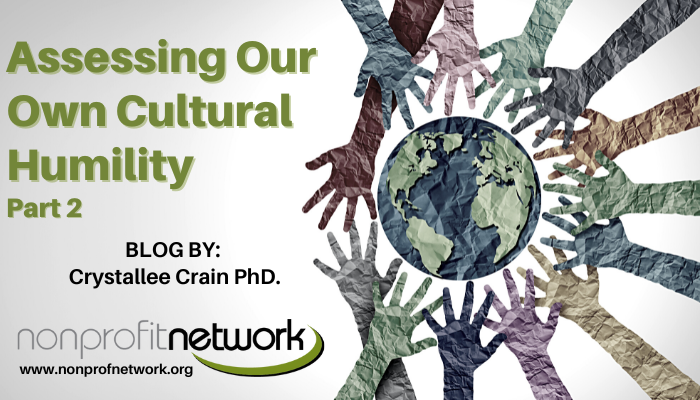

Crystallee Crain PhD.
Capacity Builder
Part 2: Assessing Our Own Cultural Humility
There are a variety of ways to gain a deeper perspective on your leadership and impact in the community from a cultural humility lens. The invitation of inquiry is one way, asking ourselves to evaluate how we consider, engage, and repair our relationships with people who are different from us.
Nonprofit Network invites readers to take a 5 minute survey assessment so that we can get a big picture of where we stand as the nonprofit field in Michigan. We plan to share the results early next year with recommendations for additional learning.
The survey is anonymous.
In Part 1: Why Cultural Humility - we discussed a variety of truths around the need to infuse a cultural humility lens into nonprofit leadership.
We understand that cultural humility aids in effective communication, as it allows people to understand and respect differences in communication styles and behavioral norms across cultures. It enhances the ability to work collaboratively in diverse teams, as it fosters an environment of mutual respect and understanding.
We also recognize that cultural humility includes the ability to maintain an interpersonal stance that is other-oriented, or open to the other in relation to aspects of cultural identity that are most important to the person. Deepening your personal agency can lend to your ability to remain open and self-aware and can support ways of being to facilitate the most just outcomes.
Experiences to Consider
Scenario 1: When we think of a family that made it to your organization after being told NO three times for support in housing, and the first person they see in your office tells them to fill out more forms, to explain and prove their need - how do you think that feels? Is there a different approach to getting your organizational needs met (data) and the needs of the community met (basic needs)? Should they be different or aligned? Who decides?
Scenario 2: How about the young man who comes in and needs language assistance on job applications, he speaks Spanish with limited English but can generally understand, do you frantically try to find someone and display this chaos to the client so they feel like they are inconvenient to help or do you treat them with ease so their needs can be met and you can be prepared for the community you serve to show up. Do you anticipate their needs and be prepared to offer language assistance?
Scenario 3: When a cisgender woman calls and shares that she's a victim of violence - do you assume it’s domestic violence? How might that assumption be a closing of an opportunity to provide care? Are there other ways to engage with a person where assumptions made by you don’t take center stage?
Personal agency and cultural humility are two vital components in the development of individuals that contribute significantly to their overall personal growth and societal interactions. Personal agency refers to an individual's capacity to make decisions and take actions that influence their life's course. It denotes the belief in one's ability to exert control over their own behavior and environment.
Developing personal agency is important for a myriad of reasons. It can foster self-confidence and self-efficacy. When individuals believe that they can make meaningful changes in their lives, they are more likely to attempt and succeed at challenging tasks, leading to increased self-esteem and overall happiness. Additionally, personal agency promotes growth and development. It allows individuals to identify their strengths, weaknesses, values, and passions, helping them to set and pursue meaningful goals.
Cultural humility encourages respect and understanding between individuals of differing cultural backgrounds. It fosters open-mindedness and a willingness to learn, which combats ethnocentrism and prejudice.
Personal agency and cultural humility are inherently linked. When individuals exercise personal agency, they make conscious efforts to expand their worldview and knowledge, which can include understanding and respecting cultural differences and similarities.
Email me with any questions or comments: [email protected]
Nonprofit Network invites readers to take an anonymous survey assessment so that we can get a big picture of where we stand as the nonprofit field in Michigan. We plan to share the results by the end of the year with recommendations for additional learning.
The survey takes 5 minutes.
Want even more? Click here to sign up for our weekly e-newsletter. Each week you'll get a link to the most recent news, workshops, and sector updates. We promise to respect your time and will not flood your inbox. We only send one e-newsletter each week and when any timely important announcements need to be made.

